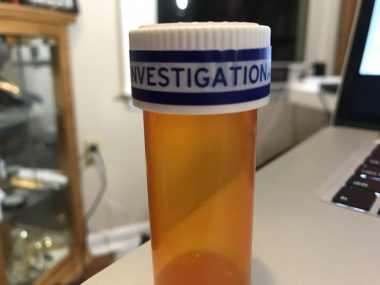Imagining a Future Generation Without Idiopathic Pulmonary Fibrosis

During an appointment at my clinic shortly after my idiopathic pulmonary fibrosis (IPF) diagnosis a few years ago, I had a conversation with my pulmonologist about clinical trials. That discussion led to my personal commitment to support research as much as possible. The conversation ended with a simple question: “How can I help?”
IPF patients currently have two anti-fibrotic drugs approved by the U.S. Food and Drug Administration (FDA) to slow the disease’s progression. Those drugs, Esbriet (pirfenidone) and Ofev (nintedanib), were developed independently and underwent clinical trials before being authorized for clinical use for IPF patients. Both drugs were able to complete clinical trials thanks to individuals, including patients, who were willing to participate in a research program for investigational new drugs.
I recall a research associate approaching me immediately before a procedure to ask if I would participate in a study that required a collection of a sample during the procedure. I was surprised when she told me that most people declined to participate.
Why?
Is it a fear of the unknown? Is it a failure to understand the safety features of a clinical trial? Is it a lack of information about available clinical trials or research opportunities? Perhaps it is all three. In my view, the answer to each of these questions is the same: education and awareness.
Education
Trusted educational resources have become more widely available, from treatment facilities to the comfort of your favorite chair. For example, when entering the parking lot elevator at Inova Fairfax Hospital in Falls Church, Virginia, an informational poster about research opportunities greets visitors. A simple Google search for “clinical trial education programs” will guide you to formal education programs and patient education programs. The National Institutes of Health (NIH) provides a variety of trusted education and awareness resources about clinical trials.
Awareness
Armed with a better understanding of research and clinical trial opportunities, how do you find these opportunities? My first step was the conversation with my pulmonologist. Who better to know which research or clinical trial opportunities might be right for me? There are multiple ongoing clinical trials and research opportunities at any given time. Pharmaceutical companies, researchers, and investigators are all competing for participants for their specific projects. It has been my experience when participating in clinical trials that progress is often slowed due to an inability to recruit sufficient qualified volunteers. Those qualified volunteers are not just IPF patients, there are also opportunities for healthy volunteers in many trials.
Finding a trial
I have used a few primary tools to learn about clinical trials and research opportunities. If you want help finding a clinical trial match, Pulmonary Fibrosis News can help. Simply complete a survey and Pulmonary Fibrosis News will reach out to you if there is a clinical trial you might be a good match for. The NIH maintains a searchable online database at clinicaltrials.gov. IPF patients are fortunate that the Pulmonary Fibrosis Foundation created a clinical trial finder that is searchable based on a questionnaire you complete, or you can simply review studies to learn more about each one.
Safety is built into each trial
The FDA requires an Institutional Review Board (IRB) to be established to provide oversight of any clinical trial with human research participants. An IRB has a specific composition of both scientist and nonscientist personnel who are responsible for fulfilling the role of watchdogs during the conduct of a clinical trial. Their responsibility includes everything from the protocols and reporting requirements to how the clinical trial will be ended. The most important role of the IRB is informed consent, which provides the patient participant with all of the necessary information about the clinical trial, including the risks.

I keep a pill bottle labeled “investigational new drug” on my desk from a trial I was enrolled in. It reminds me of how important clinical trials are to the PF patient community. (Photo by Sam Kirton)
Walking the talk
I made the decision shortly after diagnosis to support each research opportunity I found in which I met inclusion criteria. Over the course of more than four years before transplant, I was excluded from only one clinical trial. I participated in successful trial phases, trials that were terminated when the sponsoring pharmaceutical company couldn’t see a discernible difference between the placebo and the study drug, procedural trials, and medical equipment trials. I have also been followed in the PFF Registry for almost five years now.
I have observed that research findings and clinical trials make incremental progress in contributing to a better understanding of IPF. Even incremental progress lets me imagine a future generation without IPF. It is how we can make every breath count, not only for us today, but more importantly, for a future generation as well.
Note: Pulmonary Fibrosis News is strictly a news and information website about the disease. It does not provide medical advice, diagnosis, or treatment. This content is not intended to be a substitute for professional medical advice, diagnosis, or treatment. Always seek the advice of your physician or other qualified health provider with any questions you may have regarding a medical condition. Never disregard professional medical advice or delay in seeking it because of something you have read on this website. The opinions expressed in this column are not those of Pulmonary Fibrosis News or its parent company, Bionews, and are intended to spark discussion about issues pertaining to pulmonary fibrosis.









Anthony Fay
I have never been approached to participate in any clinical trial. At this point I can not think of any reason why I would refuse. AJF
Samuel Kirton
Anthony,
Thanks for reading my column. I hope you take the next opportunity you are in your clinic to ask about participating in research. If your care team is not aware of research opportunities, I encourage you to use some of the tools in the column to find an opportunity to participate in research.
Sam ...